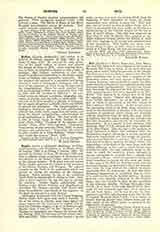

Buffier, CLAUDE, philosopher and author, b. in Poland, of French parents, May 25, 1661; d. in Paris, May 17, 1737. He received his early education at the Jesuit College in Rouen and entered the Society of Jesus in 1679. After teaching literature in Paris, he returned to Rouen to take a chair of theology. Msgr. Colbert, archbishop of that city, issued a pastoral recommending to his clergy certain books of Gallican and Jansenistic tendencies. Buffier attacked the pastoral in a pamphlet and having refused to make a retractation journeyed, with the leave of his superiors, to Rome to lay his case before the Congregations. There he easily justified himself and returning to Paris was connected, from 1701 to 1731, with the “Journal de Trevoux”. He published works on history, asceticism, biography, education, literature, and especially on philosophy. He was not, as is often asserted, a disciple of Descartes, for he rejects altogether methodic doubt and follows in general the scholastics. The Encyclopedists, according to Tabaraud, inserted in their publications, without due credit, entire pages from his books, and Reid, the Scotch metaphysician, acknowledges his great indebtedness to Buffier. His chief works are: a Life of Count Louis de Sales, brother of the saint (Paris, 1708); “Pratique de la memoire artificielle” (Paris, 1701) often reprinted; “Grammaire francaise sur un plan nouveau (Paris, 1732), in many editions and translations; “Exposition des preuves les plus sensibles de la Vraie Religion” (Paris, 1732); and “Cours des sciences” (Paris, 1722).
WALTER DWIGHT

